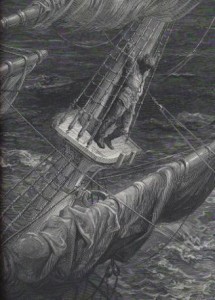Words exist that can, when used by a poet, achieve a dim monochrome of the body’s love, but beyond that they fail miserably. – John Wyndham, The Crysalids

Going into poetry next cycle I’m having some mixed feelings. I like reading poetry, I love hearing poetry, especially when it has something to say. But I can’t write it worth a lick. I have a lot more practice writing prose, and, well, you can judge how well I can do that.
I’ve always wanted to be able to write poetry. I’ve always liked the John Wyndham quote cited above. Poetry can be expressive in a way that prose can’t. Yet prose can tell a story in ways that poetry cannot. There is, of course, a long history of story poems. The Rhyme of the Ancient Mariner was a constant companion when I was bicycling solo around Lake Superior.
At any rate, Brian Beglin has a wonderful review of a novel written by a poet (Margo Berdeshevsky) (found via the Daily Dish). Belgin writes that often the combination does not quite mesh, and in working through why not he comes to the conclusion that poetic phrase do not work in prose because:
When poets write fiction, it can sometimes read like a transfer student trying to navigate the unfamiliar hallways of a new school. Sometimes this works to brilliant effect, as the poet can put a fresh shine on the fiction writer’s familiar tools. In Simon Van Booy’s The Secret Lives of People in Love, the sentences feel brisk, bright, exact, like blocks of ice chiseled into smooth, brimming faces. Conversely, Berdeshevsky’s sentences seem to ache for line breaks, for the leaps and turns vital to a poem but often detrimental to fiction: “There’s a noise she is not waiting for. Scratching like—a light knocking—and again a scratching, as of unsheathed nails on her door.” Craft-wise, these bursts of language are fascinating; yet they have the net effect of poetry: they stop time with their beauty. They can bring a story—which relies on forward momentum, on cause and effect—to a halt.
Not having read the books he references I can’t opine on if he’s right or wrong, however, it is a beautiful distinction he makes: poetic sentences stop time with their beauty, but you don’t want to stop anything when you’re telling a story.